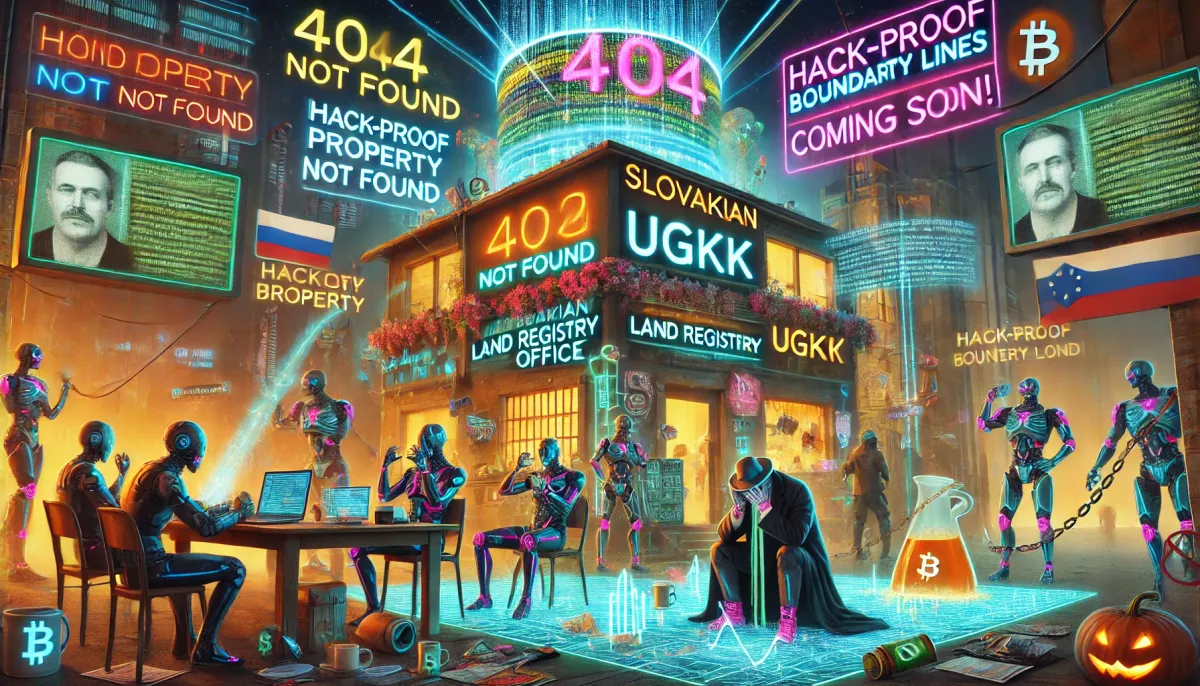“Czech, Mate: Slovakia’s Land Registry Takes an Unplanned Sabbatical”

If you’ve ever wondered how the collapse of modern civilization might begin, you can stop pondering dystopian novels and just glance at Slovakia, where the mighty guardians of maps, land deeds, and obscure property squabbles—the Office of Geodesy, Cartography, and Cadastre (UGKK)—have been rendered utterly useless by a cyber-attack. Yes, folks, it appears that even the noble art of bureaucracy is not immune to digital shenanigans.
The UGKK is no small fry; it’s the system that keeps track of who owns what, where, and how much they’re arguing about it. But on January 8, Slovakia’s Interior Ministry regretfully informed the nation that this sacred database had been hit by what they called “the largest cyber-attack in Slovakia’s history.” (An honorific title that feels a bit like boasting about having the world’s largest collection of mildly interesting rocks.)
The attack has left cadastral departments in Slovakia utterly incapacitated. That’s right—no land deals, no property squabbles resolved, and no one to adjudicate that your neighbor’s shed is, in fact, two centimeters over the line. Imagine the chaos! Property sales are frozen, mortgages delayed, and parking permits in Bratislava? Forget about it. Somewhere, a Slovakian real estate agent is quietly weeping into their overpriced latte.
Blame Game: Now Featuring International Intrigue!
Naturally, this debacle has prompted a flurry of finger-pointing, because what’s a crisis without some good old-fashioned geopolitical drama? Minister of Agriculture Richard Takáč wasted no time in implicating Ukraine as the likely culprit, presumably because it’s always easier to blame your neighbor when your fence falls down. The timing is rather convenient, given Slovakia’s gas dispute with Ukraine and their recent coziness with Russia. (You know, just the usual neighborly squabbles over life’s essentials, like heating your home in January.)
Takáč even compared the attack on Slovakia to a similar incident targeting Russia, as if the perpetrators decided to make a pit stop in Bratislava while touring Europe’s least secure servers. “A Ukrainian trace” is apparently the leading theory, though no hard evidence has been produced yet. But hey, why let facts get in the way of a good narrative?
The Seven-Digit Ransom: No Bitcoin, No Deal
To add insult to injury, the hackers have demanded a seven-digit ransom, presumably payable in Bitcoin, canned goulash, or whatever it is cybercriminals hoard these days. Slovak officials, however, assure citizens that all data is safely backed up, so there’s no risk of fraudulent ownership changes. (Which is a relief for anyone worried their apartment might suddenly belong to “Vladimir the Land Baron.”)
Still, there’s no denying the disruption. Real estate deals are on ice, municipal services are flailing, and one assumes that somewhere, a Slovakian lawyer is hysterically flipping through the How to Handle a Ransomware Crisis for Dummies handbook.
Press Conferences and Calm Reassurances
Slovakia’s political class has, of course, been quick to reassure citizens. State Secretary Ivan Ivančin solemnly declared that there’s no risk to “the property of ordinary people.” (Which is exactly what you want to hear when your life savings are tied up in an ordinary Bratislava townhouse.) Meanwhile, the UGKK promises to provide updates via their website, which is presumably a comforting gesture for the three people who know how to find it.
As if to underline the gravity of the situation, Takáč referred to this as a “profound disruption to critical civilian infrastructure.” Now, I’m no expert on Slovakian politics, but if your biggest infrastructure disaster involves slightly delayed property transactions, you might want to count your blessings.
The Broader Implications
Cyber policy expert Pavlina Pavlova has rightly pointed out that this attack is part of a broader trend of targeting critical infrastructure during wartime. It’s a sobering reminder that in the digital age, wars aren’t just fought with tanks and missiles—they’re fought with keyboards, too. Of course, this doesn’t make it any less irritating for the Slovakian who just wants to sell their grandmother’s cottage.
What’s Next?
For now, Slovakia will soldier on. The UGKK’s physical offices will partially reopen on January 13, presumably to a stampede of frazzled citizens clutching deeds, maps, and hastily scribbled complaints about the neighbor’s garden gnome encroaching on their property line.
In the meantime, we can only hope Slovakia’s land registry bounces back stronger than ever—maybe with some cybersecurity upgrades, like a password that isn’t just “1234” or a firewall that isn’t powered by hope and duct tape. Until then, the rest of us can watch from afar, marveling at how even the most mundane systems can fall victim to 21st-century chaos.
Because if there’s one thing we’ve learned, it’s that even maps, of all things, can become the stuff of international intrigue. And really, isn’t that just peak 2025?
Comments ()